2022, SACRAMENTO, CALIFORNIA, USA
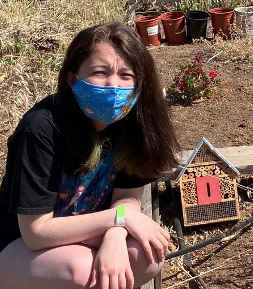
Josephine Rios and Natalie Durling, students at George Washington Carver School of Arts and Sciences, took on a project that both beautified their school’s campus and created habitat for native pollinators. The duo, aiming to attract a variety of pollinators to the school garden, did their research (or “beesearch” as they called it) on specific species to plant and bee hotel to install. They also installed drip irrigation in their plot, which will serve as a demonstration garden highlighting water-wise, and pollinator friendly landscaping practices.
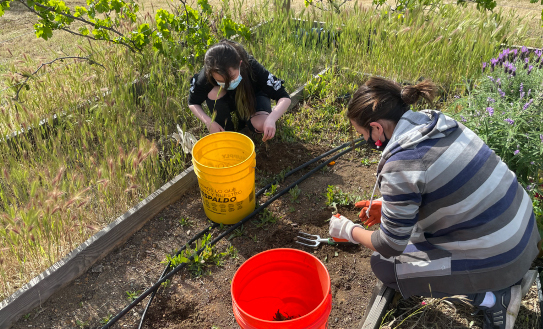
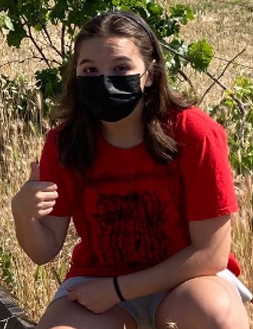
USA
Campus Tree Planting
2022, SACRAMENTO, CALIFORNIA, USA
Grant High School students Mai Lee, Husia Lee, and Visay Phasavath proposed and implemented a drought-tolerant tree planting on their school’s campus. The trees will provide shade, help capture and store carbon dioxide from the atmosphere, as well as create an attractive space on campus for students to gather. The team reached out to Sacramento Tree Foundation for assistance, and the organization provided trees, as well as guidance on tree species, planting techniques, and proper care of the saplings. Fellow students Joscelyn Lor, Tatiana Blackmon, Ariya Vue’s proposal also helped obtain funding and materials needed to make the tree planting project a success.

Campus Clean-up & Trash and Recycling Bins
2022, SACRAMENTO, CALIFORNIA, USA
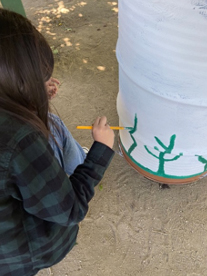
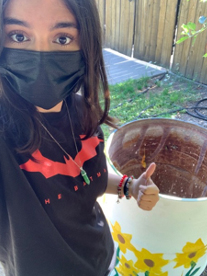
Selena Garcia and Samsara Gomez, students at Grant High School were concerned about the amount trash on their school campus. They knew that in addition to making campus unsightly, that the trash has potential to be washed into nearby waterways, and/ or cause issues for soil, plants and wildlife in the area. They tackled the problem by creating clean -up groups to pick up trash around campus after lunch 2-3 times per week for 3 months (until school ended). They also added additional trash and recycling bins around campus. The bins were painted in bright attractive colors to encourage student use. The team also created and posted signage in areas they saw most of the litter, encouraging students to properly dispose of their trash after lunch, etc. Fellow students Jocelin Perez, Belen Thompson, Sara Rios, Yadira Manriquez, Bryan Portillo, and Eliezer Salazar assisted in the implementation of this successful project, which the team hopes to continue next school year.
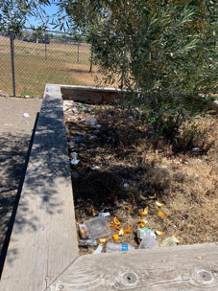
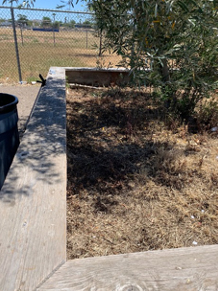
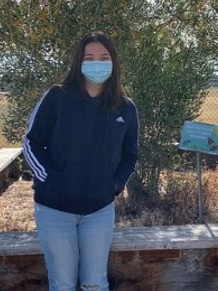
Promenade Pollinator Planting
2022, SACRAMENTO, CALIFORNIA, USA
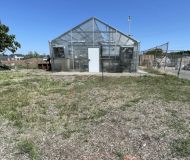
Grant High School student Landon Lo’s proposal was to support pollinators by creating and expanding habitat on the school campus. Helped by fellow students Valeria Sanchez, Adan Lopez, Chris V. and others, he was able to see his project through and transform 4 raised planter beds into gardens boasting a variety of pollinator-friendly, drought tolerant plant species. Their plantings surrounded a beautiful “pollinator totem” to create a beautiful space on campus.
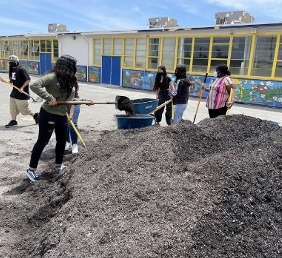
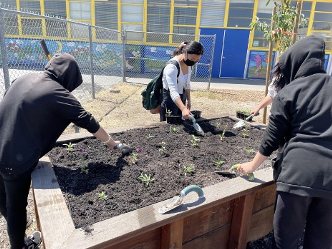
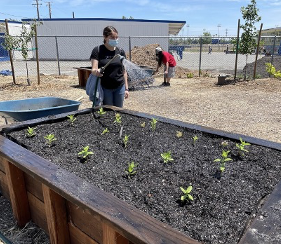
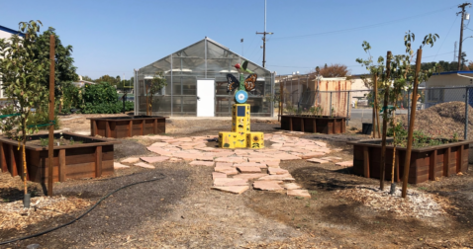
Garden Education for 5th graders
2022, SACRAMENTO, CALIFORNIA, USA
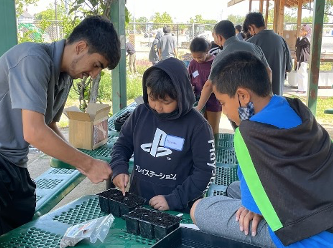
Jessica Espejo Arellano, Kathy Nguyen, Abigail Murillo Maldonado, and Cher´Nae Perry, students from Grant High School’s GEO Academy, invited 5th and 6th graders from Hagginwood Elementary to the Grant garden to learn about seeds, vegetable and pollinator plants, as well as the benefits of composting. The elementary students planted seeds, learned plant anatomy by cooking “5 plant part chow mein”, investigated critters in the compost and soil, and made plant ID bookmarks. The GEO student leaders planned and led the hands-on activities with the rotating groups. Additional students from GEO, Ghulam Murtaza Niazi, Rodrigo Gatto, Alejandro Gil-Reyes, Milton Molina helped make this day a fun, educational and successful event for all.
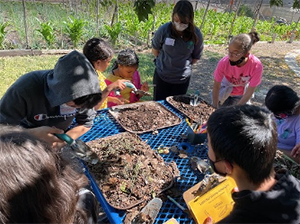
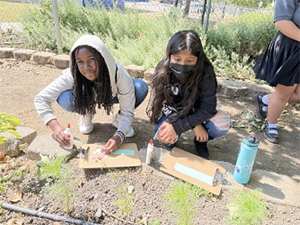
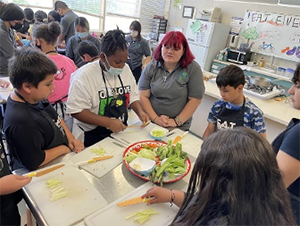
#WaterShedWash
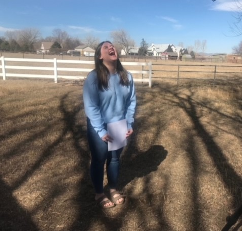
2021, Fort Collins High School, Fort Collins, Colorado, USA
Emma Eddy
The Cache La Poudre Watershed covers 1,000 square miles of land and supports about 330,000 people. At home car washes can degrade the health of our watersheds. That’s why Emma decided to take action! To spread awareness over her concern and to educate the community, she developed an educational video that she was able to share on social media. It gained over 300 views! The City of Fort Collins Utilities shared her project on their social media sites as well. As an added incentive she embedded her own contest for three people to win a car washing gift card for a year that was generously donated by Breeze Thru Car Wash. Viewers entered the contest by using her hashtag #WaterShedWash. The winners were selected and now have a chance to improve their watershed.
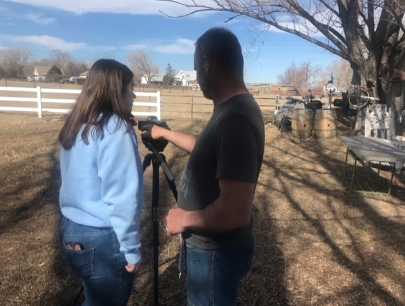
Education for Younger Generations
2021, Northridge High School, Greeley, Colorado, USA
Juan Reveles Hernandez
Education is key for developing informed, active water citizens. That’s why Juan dedicated his time and energy to educate elementary students on their watershed. Juan developed a lesson to introduce students to watershed concepts. He partnered with a 3rd grade teacher at S. Christa McAuliffe and presented the lesson to the students remotely. Juan supplied students with materials that could be found around the home and constructed watershed models with those materials. The lesson was structured in such a way that students had the opportunity to complete the lesson in class or from home. This made it inclusive for students attending class remotely during the COVID-19 pandemic. To evaluate his lesson, he quizzed the students before and after they completed the lesson. He found that the students scored phenomenally high after completing his lesson. We have some future water scientists in our presence!
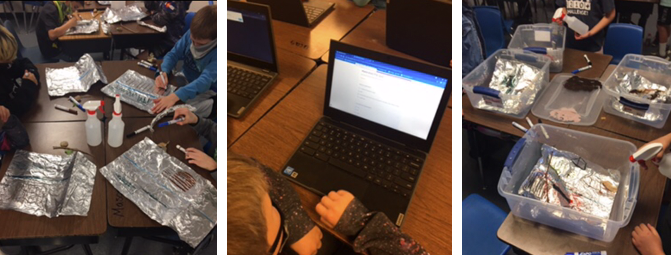
Our Blooming Watershed
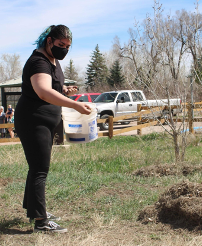
2021, Greeley Central High School, Greeley, Colorado, USA
Kimberly Gonzalez Jimenez
Pollinators are an important component to the health of our watersheds. They contribute to the diversity of our watershed and the existence of our plants. Pollinator gardens as recommended by the U.S. Forest Services and the United States Department of Agriculture as pollinators are known to help boost pollinator populations. That’s why Kimberly decided to plant a local pollinator garden. The garden was planted within the Pouder River Panch Natural Area (a city park) in Greeley, Colorado. It includes fourteen different species of flowers and plants to attract pollinators. This will in result cater to our declining pollinator population and provide them with a chance at steading their numbers so they can continue serving our watersheds and us!
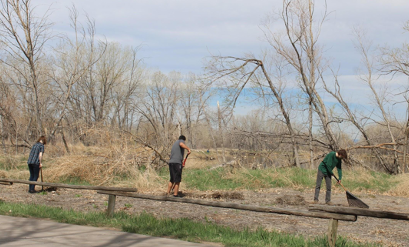

The Pandas Choice
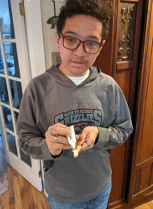
2021, Northridge High School, Greeley, Colorado, USA
Pamela Perez
Plastic is everywhere and we use them everyday. One of them being plastic toothbrushes. Pamela found that plastic can travel through many other watersheds and end up in the ocean. This in turn affects our water quality and organisms – including humans. She learned that plastic toothbrushes can take up to 400 years to decompose! That’s why she decided to encourage her peers to make the switch from plastic toothbrushes to bamboo toothbrushes. Pamela constructed a presentation with all the details on why it’s important to make the switch. This presentation was shared with peers remotely or presented by teachers, as there were COVID protocols restricting Pamela from presenting herself. Pamela also distributed bamboo toothbrushes to students that reviewed her presentation. Pamela received a lot of positive feedback from her peers. It sounds like her peers are happy they made the switch!
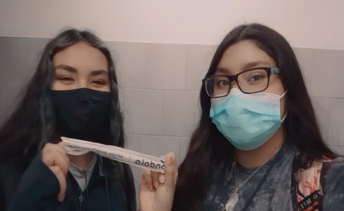
Bracelets for Bats
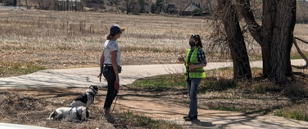
2021, Greeley Central High School, Greeley, Colorado, USA
Saria Mowrer
Saria found that the population of Little Brown Bats has decreased 90% in the past 20 years alone, and scientists predict that they may be extinct by the year 2030. This is due to habitat loss as well as a fungal disease known as White-Nose Syndrome (WNS) that has been wiping them out by the thousands. WNS wakes bats up during hibernation, and causes them to lose the fat that they had built up to survive the winter. It is caused by pollution in and near bats habitats, so the best way to combat it is to provide clean habitats for local bat colonies. Continue reading